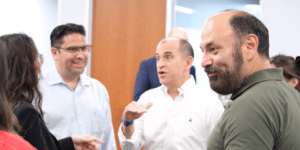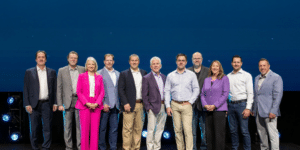Joe Pringle, a Christian CEO Helping Leaders Find Joy with Less Stuff
by Joe Pringle, President of National Christian Foundation Chicago
A humble, transparent, and inspiring testimony of one leader’s journey learning to find joy in living with less and giving away more.
Is your stuff holding you back from a better life? There came a time in my life when my wife, Tami, and I started to ask ourselves questions like these, which eventually demanded answers. What we discovered led us to less stress and more joy in giving together as a family.
I grew up in a wealthy suburb of Chicago. Business ownership was custom for our family. On my mother’s side was a family-owned business, Chicago Rawhide, that evolved from making leather products to supplying multiple industries as the world’s leading oil seals manufacturer. My family eventually sold the business to the owner of Fiat, which created a significant “liquidity event” for us.
I used the money I received from the sale to start a trucking company. This business’s success helped me buy my father out of the steel business when I was just 27. Six years later, I purchased a competitor ten times the size of the physical location of the original family business. I was achieving the world’s definition of success.
With that success came the ability to buy a lot of nice stuff. We purchased my grandmother’s vacation home on Lake Geneva, an 1880s historic home in Telluride, Colorado, and our dream home in suburban Chicago.
God had blessed us with the ability to make money, but the more we accumulated with it, the more complicated our lives became. It hadn’t hit me yet that maybe this consumption mentality (packaged as the American dream) was robbing our joy. As the steel industry grew more volatile and risky, I decided l needed to sell my business and start investing in others. We had all this stuff that required maintenance and a big chunk of my time. As I grew exhausted and unsatisfied, the questions around it all became louder.
Over time, thanks to my church, mentors, Bible studies, and a program in spiritual transformation, my true desire became clearer. I had experienced God at work in my heart and wanted to partner with Him. I began examining everything with stewardship in mind: Is hanging onto this going to bring me closer to God? Is it neutral? Or is it taking me further away from Him? Am I holding onto something that’s distracting me from the life that is truly worth living? (1 Tim. 6:18-19)
In light of these prayers and a desire for minimizing distractions, we sold two of our homes, and for the first time in our 41 years of marriage, Tami and I became renters. We love our two-bedroom apartment, which allows much less upkeep and stress. We kept the property on Lake Geneva for family gatherings, entertaining friends, and hosting Journeys of Generosity and spiritual retreats. Though still a work in progress, little by little, we’ve gotten rid of a lot.
These five questions help us discern what we keep or release.
1. Is this an asset or liability?
Back in 1979, when my mom’s family sold that business, I got to witness a lot of relatives “win the lottery,” so to speak. Some were prepared to handle the amount of money they received. Others weren’t. The windfall was a blessing to some; others ended up worse off than they’d been before receiving it. I’m thankful I had a business degree, or I might have gone down a similar path.
I wonder now why many wealthy, even business-owning, families don’t teach the simple difference between a liability and an asset, because these lessons can apply to our spiritual lives, too. What if we asked this question about everything we owned: Is this an asset or a liability to my relationship with God?
2. What is it doing (or will it do) to my family?
It’s so important to prepare a family for wealth. If an asset we are enjoying isn’t serving a purpose, or worse, it’s building a sense of entitlement or wastefulness in our kids, that’s a big sign we should release it. In our case, keeping the property on Lake Geneva was valuable for relationship-building and memory-making. In addition, it was a fruitful place to bless others and take time away to be with God.
We should also consider the amount we plan to give in light of its impact on our kids’ lives—positive or negative—which is no easy task and requires significant intentionality and discussion.
3. Am I stewarding or hoarding this?
I kept thinking about the bigger barns story in Luke 12. We’ll be judged by what we did with what we had—whether we chose to use it for God’s purposes or to hoard it. God calls a hoarder a fool! I was building bigger barns. When I asked myself, “Am I being a good manager of the things I am blessed to be stewarding?” the decision to sell or give more away became clearer.
Once our kids were older, there was no good reason to keep the house in Telluride. I wish I’d known at the time the value of giving a property before the sale, but it still felt so good to sell it. Why had it been so hard to come to that decision?
4. Why am I hanging onto this?
When I was candid with myself, I realized I’d kept the Telluride house for the wrong reasons. It helped us make family memories for years, but I kept it after it was no longer fulfilling that purpose. Why? An embarrassing part of the reason was so I could boast about owning it. When others bragged about their place in Aspen or Vail, my historic home in Telluride would impress. But I realized the people I was trying to impress had a mantra—the one with the most toys wins—and I too had subconsciously adopted it at some point. When we finally sold that house, it was such a relief to release it.
5. Who could benefit if I gave it away?
My family had grown very involved with a ministry in the infamous Cabrini Green neighborhood on Chicago’s Near North Side, Holy Family School. We grew passionate about this community of people and the school itself. The mission of providing high-quality Christian education to underserved African American families spoke to us.
We all felt God calling us to make a pledge, so we called a family meeting to decide about selling the Telluride house. It felt so good to use the money from something we no longer needed to help a ministry that could do so much with it. We have fond memories of the time our family spent in Telluride, but we’ve never regretted the decision to use it to give to this ministry we all loved. This experience showed me that when you make yourself available and show up where God is already at work, you get to experience a miracle.
“Comparison kills gratitude.” Thankfully, Tami reminds me of this. It’s sometimes hard for me when I see others getting cool stuff. I know that I’ll continue to want more things, thinking I “need” them, or worse, I “deserve” them. I’ve found the antidote for this temptation is to surround myself with a community that believes we own nothing and are simply stewards of what God has blessed us to manage.
We need to be available to God, act on His nudges, keep our focus on being His light in the world, and humbly glorify Him through our actions.
“Do not conform any longer to the pattern of this world, but be transformed by the renewing of your mind. Then you will be able to test and approve what God’s will is – his good, pleasing and perfect will.”
– Romans 12:2
All the work of buying, owning, and selling businesses and properties left me with something, even after the “stuff” was gone: knowledge and empathy. Those activities are not inherently bad—in fact, they can produce a lot of good—but only when surrendered to God’s will and way. Now, I use my time helping others think through these questions so that they can use their stuff in God-honoring and exciting ways, too!
June 22, 2021





